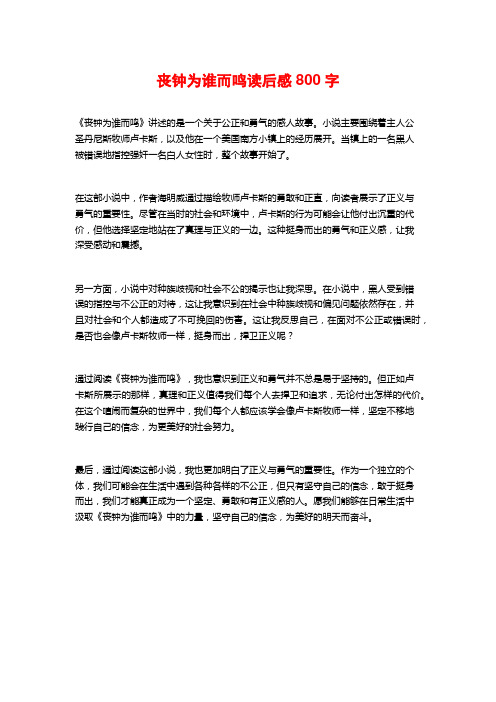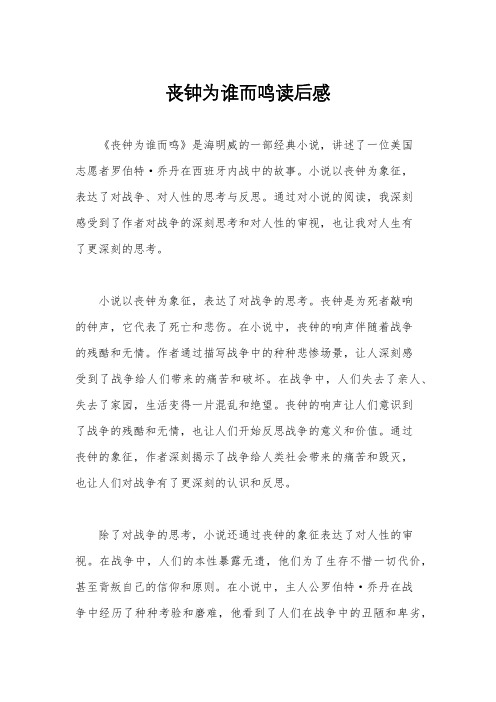美国文学选读-丧钟为谁而鸣
海明威丧钟为谁而鸣的读后感

海明威丧钟为谁而鸣的读后感海明威丧钟为谁而鸣的读后感1谁都不是一座岛屿,自成一体;每个人都是那广袤大陆的一部分。
如果海浪冲刷掉一个图块,欧洲就少一点;如果一个海角,如果你朋友或你自己的庄园被冲掉,也是如此。
任何人的死亡使我受到损失,因为我包孕在人类之中。
所以别去打听丧钟为谁而鸣,它为你敲响。
——约翰·堂恩《丧钟为谁而鸣》是美国作家海明威于1940年创作的长篇小说,讲述的是美国青年罗伯特·乔丹志愿参加西班牙政府军,为配合反攻,奉命和地方游击队联系,在敌后搞爆破活动,完成炸桥任务,但在撤退时负伤并献出了生命。
这是海明威篇幅最大的一部小说,但全书情节仅局限于三天之内。
通过主人公罗伯特·乔丹三天的经历,展现出了一幅友情、爱情、责任、信仰相互交织在战争中的宏大场面。
由战争前的激进逐渐转变为意志消沉的巴勃罗、不想杀人却不得不杀人的矛盾的安塞尔莫、积极响应炸桥任务迎着死亡的勇士比拉尔、与乔丹一见钟情且相爱至深的玛丽亚,各个人物特点鲜明,读后都活灵活现地展现在读者的脑海中。
丧钟为谁而鸣小说在铺展反法西斯战争的同时,更加注重对人生意义的探讨。
人生的意义不是用时间来衡量,而是对于“现在”的态度。
正如文中所说:除了现在再没有别的了,既没有昨天,当然啦,也没有明天。
你要活到多大才能明白这一点呢?只有现在,而如果“现在”只有两天的话,那么两天就是你的一生,而这一生中的一切都将相应地压缩。
你就这样在两天中度过一生。
如果你不再抱怨,不再要求你永远不会得到的东西,那么,你就会过到美好的一生。
小说的主旨提醒我们要热爱生活,热爱祖国。
“我爱你,就象我爱我们为之奋斗的一切。
我爱你,就像我爱自由,尊严和人们要求工作、不愿挨饿的权利。
我爱你,就像我爱我们所保卫的马德里,就像我爱所有那些牺牲的同志。
很多同志牺牲了。
很多,很多。
你没法想象有多少。
但是我爱你,就像我爱世界上我最爱的东西,而我爱你超过了这一切。
”我又有什么理由不热爱自己的祖国呢?小说的名字是一个问句,但答案却是我们每个人都明白的。
丧钟为谁而鸣读后感800字

丧钟为谁而鸣读后感800字
《丧钟为谁而鸣》讲述的是一个关于公正和勇气的感人故事。
小说主要围绕着主人公
圣丹尼斯牧师卢卡斯,以及他在一个美国南方小镇上的经历展开。
当镇上的一名黑人
被错误地指控强奸一名白人女性时,整个故事开始了。
在这部小说中,作者海明威通过描绘牧师卢卡斯的勇敢和正直,向读者展示了正义与
勇气的重要性。
尽管在当时的社会和环境中,卢卡斯的行为可能会让他付出沉重的代价,但他选择坚定地站在了真理与正义的一边。
这种挺身而出的勇气和正义感,让我
深受感动和震撼。
另一方面,小说中对种族歧视和社会不公的揭示也让我深思。
在小说中,黑人受到错
误的指控与不公正的对待,这让我意识到在社会中种族歧视和偏见问题依然存在,并
且对社会和个人都造成了不可挽回的伤害。
这让我反思自己,在面对不公正或错误时,是否也会像卢卡斯牧师一样,挺身而出,捍卫正义呢?
通过阅读《丧钟为谁而鸣》,我也意识到正义和勇气并不总是易于坚持的。
但正如卢
卡斯所展示的那样,真理和正义值得我们每个人去捍卫和追求,无论付出怎样的代价。
在这个喧闹而复杂的世界中,我们每个人都应该学会像卢卡斯牧师一样,坚定不移地
践行自己的信念,为更美好的社会努力。
最后,通过阅读这部小说,我也更加明白了正义与勇气的重要性。
作为一个独立的个体,我们可能会在生活中遇到各种各样的不公正,但只有坚守自己的信念,敢于挺身
而出,我们才能真正成为一个坚定、勇敢和有正义感的人。
愿我们能够在日常生活中
汲取《丧钟为谁而鸣》中的力量,坚守自己的信念,为美好的明天而奋斗。
丧钟为谁而鸣的寓意哲学

丧钟为谁而鸣的寓意哲学
1、《丧钟为谁而鸣》一书的寓意:不应悲观,而应当直面人生。
在悲剧性但又深刻的哲理的展现中,使人灵魂得到了净化。
2、《丧钟为谁而鸣》讲述的是美国青年罗伯特·乔丹在大学里教授西班牙语,对西班牙有深切的感情。
他志愿参加西班牙政府军,在敌后搞爆破活动。
为配合反攻,他奉命和地方游击队联系,完成炸桥任务。
他争取到游击队队长巴勃罗的妻子比拉尔和其他队员的拥护,孤立了已丧失斗志的巴勃罗,并按部就班地布置好各人的具体任务。
在纷飞的战火中,他和比拉尔收留的被敌人糟蹋过的小姑娘玛丽亚坠入爱河,藉此抹平了玛丽亚心灵的创伤。
在这三天中,罗伯特历经爱情与职责的冲突和生与死的考验,人性不断升华。
在炸完桥撤退的时候,自己却被敌人打伤了大腿,独自留下阻击敌人,最终为西班牙人民献出了年轻的生命。
作者通过乔丹的内心独白,淋漓尽致地探讨了生与死的问题、爱情与职责的问题、个人幸福与人类命运的问题。
丧钟为谁而鸣 生死观解析

丧钟为谁而鸣生死观解析《丧钟为谁而鸣》是美国作家海明威的小说,通过描述在西班牙内战背景下的民兵接受任务炸毁一座桥梁的故事,探讨了生死观的主题。
该小说通过描写民兵部队成员周密部署炸毁桥梁的过程,以及桥梁最终未能成功被炸毁的结果,反映了人类在生死面前的无力感和虚无主义倾向。
小说中的主人公罗伯特·乔丹是一位美国志愿者,他在执行炸桥任务的同时,也考虑到自己的人生观和全人类的生死观。
小说中的“丧钟”象征着死亡和灾难的到来,而“为谁而鸣”则指着人类的求生意识和生命的意义。
在故事中,乔丹和其他人物面临生死抉择,他们经历着身体和心理上的煎熬,同时也不断思考着生命的意义。
通过乔丹和其他登场人物的对话和内心独白,这部小说探讨了几个与生死观相关的主题。
首先是人类存在的无常性和无力感。
乔丹和其他人物深刻感受到战争的残酷和死亡的临近,他们意识到自己只是世界的一部分,虽然努力去改变世界,但最终还是无法掌控生死。
这种无常性和无力感使他们产生了虚无主义的思考,对生命的意义和价值产生了怀疑。
其次是对人性的观察和思考。
在战争的残酷环境下,人们被迫面对自己最原始和最真实的一面。
小说中描写了人们的勇气、友爱、牺牲和背叛,同时也暴露出人性中的自私和残忍。
通过这种对人性的观察,作者展示了人类在生死面前的复杂和多样性,以及对生命的珍视和可贵性的思考。
最后,是对于生死观的思考。
小说中的登场人物对于生死有着不同的看法和态度,有人选择坚持自己的理想到底,有人选择面对死亡的恐惧而逃避,有人则选择用死亡来结束痛苦。
作者通过这些人物的选择和思考,探讨了生命的意义和死亡对于个体的影响。
总的来说,《丧钟为谁而鸣》通过揭示人类在战争时期的生死挣扎和思考,探讨了生死观的主题。
小说通过对人性、生命和死亡的观察,呈现了人类在极端环境下的挣扎和反思,同时也展示了人类对于生命的渴望和对于死亡的恐惧。
海明威的《丧钟为谁而鸣》

作者: 戴震
出版物刊名: 四川大学学报:哲学社会科学版
页码: 77-82页
主题词: 海明威;《太阳照样升起》;长篇小说;人物性格;“硬汉”;社会力量;代言人;青年一代;斯坦因;作品
摘要: <正> 欧内斯特·海明威(1899—1961)是以“迷惘的一代”的代言人登上欧美文坛的。
他的长篇小说《太阳照样升起》(1926)反映了战后美国青年一代的精神苦闷。
小说引用格特鲁德·斯坦因的一句话“你们全是迷惘的一代”作为题词。
“迷惘的一代”即因此得名。
由于社会力量的分化和演变,三十年代海明威逐渐放弃了那种空虚、软弱的人物性格的刻划,而代之以具有坚强不屈的个性的人物典型。
对付狂暴的世界必须有坚强的个性,描写不畏强暴的“硬汉”性格成了海明威一段时间内作品的主要精神。
但一九四○年发表的《丧。
海明威 丧钟为谁而鸣 读后感

《丧钟为谁而鸣》是美国作家海明威的一部长篇小说,出版于1940年。
这部小说以西班牙内战为背景,讲述了年轻的美国志愿军罗伯特·乔丹参加西班牙人民军抵抗法西斯的斗争的故事。
读完《丧钟为谁而鸣》后,我对这部作品产生了深刻的思考和感受。
首先,海明威以其简洁而富有力量的文字风格给我留下了深刻的印象。
他用简单的句子和直接的语言表达了人性中的复杂情感和道德抉择。
在故事中,人们面临着生死抉择,他们的勇气、牺牲和坚持都被生动地描绘出来。
另外,这部小说也对战争的真实性进行了深入的探讨。
通过描述战争中的残酷、混乱和无情,海明威呈现了战争所带来的人间悲剧和灾难。
他没有美化战争,而是以一种冷静而客观的方式展现了战争对个体和社会的摧毁力。
此外,《丧钟为谁而鸣》也探讨了人性中的爱、友情和信念。
在故事中,主人公罗伯特·乔丹与其他志愿军战士建立了深厚的友谊,他们彼此信任、支持和帮助。
这种团结与信念给予了他们面对困难和死亡的勇气和力量。
总的来说,读完《丧钟为谁而鸣》让我对战争、人性和勇气有了更深刻的理解。
海明威独特的写作风格和对战争真实性的描写给了我深刻的震撼。
这部小说以其思想深度和文学价值成为了经典之作,也让我对战争与人性之间的关系有了更深刻的思考。
丧钟为谁而鸣读后感

丧钟为谁而鸣读后感《丧钟为谁而鸣》是海明威的一部经典小说,讲述了一位美国志愿者罗伯特·乔丹在西班牙内战中的故事。
小说以丧钟为象征,表达了对战争、对人性的思考与反思。
通过对小说的阅读,我深刻感受到了作者对战争的深刻思考和对人性的审视,也让我对人生有了更深刻的思考。
小说以丧钟为象征,表达了对战争的思考。
丧钟是为死者敲响的钟声,它代表了死亡和悲伤。
在小说中,丧钟的响声伴随着战争的残酷和无情。
作者通过描写战争中的种种悲惨场景,让人深刻感受到了战争给人们带来的痛苦和破坏。
在战争中,人们失去了亲人、失去了家园,生活变得一片混乱和绝望。
丧钟的响声让人们意识到了战争的残酷和无情,也让人们开始反思战争的意义和价值。
通过丧钟的象征,作者深刻揭示了战争给人类社会带来的痛苦和毁灭,也让人们对战争有了更深刻的认识和反思。
除了对战争的思考,小说还通过丧钟的象征表达了对人性的审视。
在战争中,人们的本性暴露无遗,他们为了生存不惜一切代价,甚至背叛自己的信仰和原则。
在小说中,主人公罗伯特·乔丹在战争中经历了种种考验和磨难,他看到了人们在战争中的丑陋和卑劣,也深刻体会到了人性的脆弱和可悲。
通过对人性的审视,作者让人们意识到了人性的复杂和多面性,也让人们开始反思人类社会的发展和进步。
通过丧钟的象征,作者深刻揭示了人性的脆弱和可悲,也让人们对人类社会有了更深刻的认识和反思。
通过对小说的阅读,我深刻感受到了作者对战争的深刻思考和对人性的审视,也让我对人生有了更深刻的思考。
在现实生活中,我们也常常面临着各种各样的考验和挑战,我们需要正视自己的内心世界,审视自己的行为和选择,也需要反思人类社会的发展和进步。
只有通过对人性的审视和对社会现实的思考,我们才能更好地理解这个世界,更好地面对生活中的困难和挑战。
《丧钟为谁而鸣》深刻揭示了战争的残酷和无情,也深刻审视了人性的脆弱和可悲,它让人们对人生和社会有了更深刻的思考,也让人们对未来有了更深刻的期许。
丧钟为谁而鸣读书笔记

丧钟为谁而鸣读书笔记丧钟为谁而鸣读书笔记《丧钟为谁而鸣》是美国作家海明威的一部经典小说。
小说通过一个美国志愿参加西班牙内战的年轻人罗伯特·乔丹的经历,展现了战争的残酷和人性的复杂。
在这部小说中,丧钟象征着死亡和毁灭,而它为谁而鸣,则反映了每个人应该对他人遭受苦难的关注和关心。
作为一名志愿者,乔丹本可以置身事外,继续享受美好的生活。
但他选择了参与战争,无私地为了西班牙人民的自由与独立而战斗。
在乔丹的眼中,丧钟为整个国家而鸣,它的声音激励着他坚持战斗到底。
乔丹体验了战争带来的种种残酷和艰辛,但他并不畏惧,而是坚定地认为正义和自由的力量将最终战胜邪恶。
在小说中,丧钟的鸣响也包含着对个人命运的担忧。
乔丹与玛利亚相爱,尽管他们之间的时间很短暂,但他们彼此的情感却非常真实。
然而,在战争之中,他们无法保护自己和对方免受伤害。
每当丧钟为乔丹和玛利亚而鸣,乔丹都感到无尽的悲伤和失望。
他清楚地意识到,战争摧毁了他们的爱情和幸福,他们成了战火中的残骸。
丧钟为谁而鸣还意味着面对世界上其他地方正在发生的苦难和灾难。
乔丹知道,他所经历的这场内战只是世界上战争的一部分。
虽然他不能直接体验其他国家的苦难,但他深知他们同样需要帮助和关注。
乔丹坚信每一个人都应该对别人遭受的苦难负有责任,无论那些苦难发生在什么地方。
海明威通过《丧钟为谁而鸣》告诫人们,战争的苦难不应该被忽视。
丧钟为每一个人而鸣,它呼唤着世界上的每一个人去关注和关心他人。
战争的残酷和毁灭是人类社会的一部分,但我们不应该对此置之不理。
正义、和平和自由需要每一个人的努力和奉献。
读完《丧钟为谁而鸣》,我深深地被书中的人物和情节所感动。
我开始思考每一声丧钟为谁而鸣,是否能够在我们生活中能够有所体现呢?我意识到,世界上每天都在发生各种各样的苦难和灾难,无论是来自战争、天灾还是人为的犯罪等等。
而我们每个人都有责任关心和关注这些苦难,不论它们发生在什么地方、发生在谁身上。
- 1、下载文档前请自行甄别文档内容的完整性,平台不提供额外的编辑、内容补充、找答案等附加服务。
- 2、"仅部分预览"的文档,不可在线预览部分如存在完整性等问题,可反馈申请退款(可完整预览的文档不适用该条件!)。
- 3、如文档侵犯您的权益,请联系客服反馈,我们会尽快为您处理(人工客服工作时间:9:00-18:30)。
Analysis on the theme ofFor Whom the Bell TollsThe themes of Hemingway’s novel are always about the war ,love and death. But they are describe in different ways depending on his different books. For example, the a farewell to arms and the sun also rises were written in 1920s,for whom the bell tolls was written 10 years later. We can see the attitude of Hemingway to love war and death has developed a lot. After struggling in lostness in a long time,he got rid of his lostness.The theme of war.The writing of war in the novel A Farewell to Arms is based on Hemingway’s early experience in World War I.Frederick Henry the protagonist of the novel,goes to the war in a burst of enthusiasm.This is reflected from his blindness in joining the Italian army.The disillusionment of Frederick Henry comes to stand for the disillusionment of the World War I generation:I was always embarrassed by the words sacred,glorious,and sacrifice and the expression in war...now for a long time and I had seen nothing sacred,and the things that were glorious and no glory and the sacrifices were like the stock yards at Chicago if nothing was done with the meat except to bury it.There were many words that you could not stand to bear and finally only the names of places had dignity.Certain numbers were the same way and certain dates and these with the names of the places were all you could say and have them mean anything.Abstract words such as glory,honor,courage,or hallow were obscene beside the concrete names of villages,the numbers of roads,the name of rivers,and the numbers of regiments and date.The First World War gave that generation too much pain.That is why they got cynical about it and antiwar sentiment permeated everywhere.After World War I grew a lost generation,among which,Hemingway was the representative.But the attitude towards the war changed in the For Whom the Bell Tolls.In the 1930s,Fascism had become militant,imperialistic,and international.Although the artist devoted to the development of his art,isolated from political and social affairs,he could not ignore it any more.Just as Hemingway said that there was only one form of government that could not produce good writers,and that system was fascism.Robert Jordan,the protagonist of the novel For Whom the Bell Tolls,is not only a teacher of Spanish and a lover of Spain;he is also a writer,just like Hemingway.As an artist he is fully aware of the threat of fascist domination.But he take the duty without hesitate. And he came to the poor village and made friends with the soldiers. In the end of the article , he was not fear of death. He felt he could fight for the people who are oppressed by the fascism.Like the feeling you expected to have but did not have when you made your first communion.It was a feeling of consecration to a duty toward all the oppressed of the world which would be a difficult and embarrassing to speak out as religious experience and yet it is authentic as the feeling you had when you heard Bach,or stood in Charters Cathedral or the Cathedral at Leon and saw the light coming through the great windows⋯.It gave you a part in something that you could believe in wholly and completely....It was something that gave much importance to it and the reasons for it that your own death seemed of complete unimportance ....But the best thing was that there Was something you could do without this feeling--You could fight.Human LifeMany characters die during the course of the novel, and we see characters repeatedly question what can possibly justify killing another human being. Anselmo and Pablo represent two extremes with regard to this question. Anselmo hates killing people in all circumstances, although he will do so if he must. Pablo, on the other hand, accepts killing as a part of his life and ultimately demonstrates that he is willing to kill his own men just to take their horses. Robert Jordan’s position about killing falls somewhere between Anselmo’s and Pablo’s positions. Although Robert Jordan doesn’t like to think about killing, he has killed many people in the line of duty. His personal struggle with this question ends on a note of compromise. Although war can’t fully absolve him of guilt, and he has “no right to forget any of it,”Robert Jordan knows both that he must kill people as part of his duties in the war, and that dwelling on his guilt during wartime is not productive.The question of when it is justifiable to kill a person becomes complicated when we read that several characters, including Andrés, Agustín, Rafael, and even Robert Jordan, admit to experiencing a rush of excitement while killing. Hemingway does not take a clear moral stance regarding when it is acceptable to take another person’s life. At times he even implies that killing can be exhilarating, which makes the morality of the war in For Whom the Bell Tolls even murkier.Romantic LoveEven though many of the characters in For Whom the Bell Tolls take a cynical view of human nature and feel fatigued by the war, the novel still holds out hope for romantic love. Even the worldly-wise Pilar, in her memories of Finito, reveals traces of a romantic, idealistic outlook on the world. Robert Jordan and Maria fall in love at first sight, and their love is grand and idealistic. Love endows Robert Jordan’s life with new meaning and gives him new reasons to fight in the wake of the disillusionment he feels for the Republican cause. He believes in love despite the fact that other people—notably Karkov, who subscribes to the “purely materialistic”philosophy fashionable with the Hotel Gaylord set—reject its existence. This new acceptance of ideal, romantic love is one of the most important ways in which Robert Jordan rejects abstract theoriesin favor of intuition and action over the course of the novelFace the DeathFor Whom the Bell Tolls was written after the defeat of the Republic.During the Spanish War,Hemingway saw many heroic deeds.Hemingway,just as Robert Jordan,the hero of the novel,seemed to have found something worth dying for.If you die as these men did.then physical death means nothing and you can say as you breathe your last“Death,where is thy sting?or to use Hemingway’s own words“Those who have entered it honorably,and no man ever entered earth more honorably than those who died in Spain already have achieved immortality.Even though you died without having won,your sacrifice was not in vain,and victory shall yet be yours.Robert Jordan,like many Hemingway’s heroes,is obsessed by death from the beginning of the novel.death,Robert Jordan grows out of the fear of death at last and shows his courage in the face of death.For he has fervent belief in the cause of fighting for the people he loves deeply,as well as his perfect fulfillment in love.time.The bridge is successfully destroyed,and Jordan is mortally wounded.Instead of committing suicide,he decides to stay behind to cover the retreat of the guerrillas with his sub—machine gun.So he accomplishes his personal achievement through self-sacrifice.Each one does what he can,he thinks.He can do nothing for himself but perhaps he can do something for another.He dies not only for Spain,not only to save the girl Maria who he loves,but also his own sake in fulfillment of a moral duty.The grim world in which he had grown up has not broken Jordan nor forced him to a deal with his conscience.Jordan dies a moral victor.Whether one has fear of it or not.one’s death is difficult to accept.Sordo had accepted it but there was no sweetness in its acceptance even atfifty·two,with three wounds and him surrounded on a hill.He joked about itto himself but he looked at the sky and at the far mountains and heswallowed the wine and he did not want it.If one must die,he thought,andclearly one must,1 can die.But 1 hate it.Dying Was nothing and he had nopicture of it for fear of it in his mind.But living was a field of grain blowingin the wind on the side of a hill.Living Was a hank in the sky.Living was anearthen jar of water in the dust of the threshing with the grain flailed out andthe chaff blowing.Living Was a horse between your legs and a carbine underone leg and a hill and a valley and a stream with trees along it and the farside of the valley and the hills beyond.”Hemingway’s heroes grow up,and step by step their idea of meaning of life changes and crystallizes.参考文献1.靳伟英走出迷惘的迷雾—《丧钟为谁而鸣》的主题思想[学位论文]硕士 20022.张娜解读海明威死亡主题【学位论文】硕士 2006。
